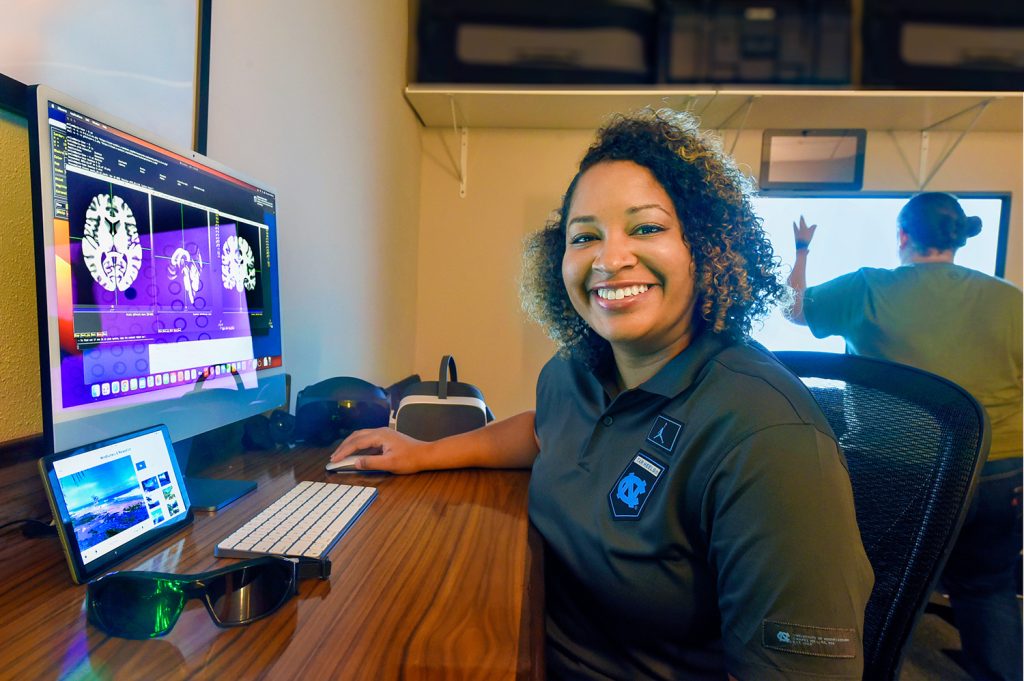
Shelby Baez, an assistant professor in the department of exercise and sport science, helps patients address their fears of returning to sport after traumatic knee injuries.
As a certified athletic trainer who was treating patients who had undergone ACL reconstruction, Shelby Baez wanted to understand how fear of their injuries was affecting their ability to return to participation in sports.
“When you talk to patients after traumatic knee injuries, we often think that a barrier for re-engaging in activity is going to be the physical side — concerns about strength and range of motion, for instance. But they say that fear of re-injury or of doing certain movements are among the primary barriers for failing to go back to sport,” said Baez, an assistant professor in the department of exercise and sport science who joined the Carolina faculty in July 2022.
Baez leads the Psychology of Sport Injury Laboratory. To improve return-to-play outcomes, her lab treats patients from both biological and psychosocial perspectives. She received a 2023 New Investigator Award from the American College of Sports Medicine and a 2024 New Investigator Award from the National Athletic Trainers’ Association. She is utilizing innovative technologies to help further her research.
“We are using tech-driven solutions like virtual reality, mindfulness meditation and mobile applications to implement psychological interventions,” Baez said. “We’re doing a clinical trial to determine if virtual reality can decrease fear and improve reaction time, alter jump-landing biomechanics and improve brain activity after ACL reconstruction.”
With VR, patients can choose the mindfulness experience that works for them, picking an environment like the mountains, the beach or the forest as they hear a meditation script.
The Carolina exercise and sport science alumna has been a Tar Heel fan since age 6. She initially planned to major in journalism or English but was also drawn to sports medicine. Baez was admitted to UNC’s athletic training program and said she also thrived in classes in English and communication studies. She valued the academic lessons learned with Meredith Petschauer in EXSS and with Leslie Frost in English and comparative literature.
“Dr. Frost is very much a person who helped me on my Carolina journey,” she said. “My classes [in the humanities] made me interested in thinking about patients from a holistic perspective.”
After graduating from UNC with a B.A. in exercise and sport science in 2013, Baez went on to pursue an M.S. in athletic training and a Ph.D. in rehabilitation sciences with a concentration in sport and exercise psychology from the University of Kentucky.
She still puts on her journalism hat as a cohost of JAT Chat, a podcast of the Journal of Athletic Training, which synthesizes the latest research for clinical providers.
Baez was recruited to UNC from Michigan State University and said it was exciting to come home to Carolina to teach and do research.
“When thinking about advancing my research, I wanted to be in a place with the resources to help me do that,” she said. “I also get to work with some of the leading sports medicine providers and researchers in the world.”
Troy Blackburn, professor and chair of the department of exercise and sport science, said Baez is a nationally recognized expert in the psychology of musculoskeletal injury and rehabilitation.
“At an early point in her career, her highly productive research line has already been funded by multiple sources, including the National Institutes of Health, and she has received the New Investigator Award in two of our national organizations within the past two years,” Blackburn said. “She is clearly a rising star in our field and a highly valued colleague.”
Darin Padua, UNC’s associate provost for academic operations, hired Baez when he was chair of exercise and sport science. He said the department set strategic objectives to recruit talented young faculty members like Baez and to support their path to promotion and tenure. Every junior faculty member is assigned both a mentor in their area of expertise as well as someone outside their research area.
Baez counts Brian Pietrosimone and Zachary Kerr among her departmental mentors. In turn, she said she’s trying to be a good mentor to the undergraduate, master’s and Ph.D. students in her lab.
“My favorite part about my job is mentoring students,” said Baez, who is teaching the undergraduate class “The Psychosocial Aspects of Athletic Injuries” this spring. “I’ve structured my lab to be more of a collaborative not a hierarchical environment. I try to give the same amount of face time that mentors like Brian have given to me, to support students’ autonomous ideas and to help them grow.”
By Kim Spurr, College of Arts and Sciences
